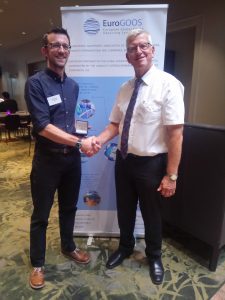 The 8th EuroGOOS international conference, titled Operational Oceanography in Service of Sustainable Marine Development, took place in Bergen, Norway, on 3-5 October 2017. The event was co-hosted by the Institute of Marine Research, IMR, and the Nansen Environmental and Remote Sensing Centre, NERSC, and co-organized with the EuroGOOS office.
The 8th EuroGOOS international conference, titled Operational Oceanography in Service of Sustainable Marine Development, took place in Bergen, Norway, on 3-5 October 2017. The event was co-hosted by the Institute of Marine Research, IMR, and the Nansen Environmental and Remote Sensing Centre, NERSC, and co-organized with the EuroGOOS office.
Delegates from 24 countries and many international, European and regional networks attended. The programme included two plenary sessions running on the first and last days of the conference, a poster session, and a day-long splinters session featuring 54 talks across the marine observation and data value chain.
On the opening day of the conference, the 2017 Kostas Nittis Medal and grant to a young researcher were awarded to Robert King from Met Office, UK. Robert presented an impressive amount of work done for improving operational forecasting systems and in situ data assimilation in oceanographic models, in his plenary flash talk.

Robert King, the winner of the 2017 Kostas Nittis Medal, with Erik Buch, EuroGOOS Chair, at the EuroGOOS 2017 Conference
The conference resumed with a forward-looking address from Peter Haugan, chair of the UNESCO Intergovernmental Oceanographic Commission, IOC, calling the EuroGOOS community to join the IOC efforts towards an impactful global Ocean Science Decade.
The EuroGOOS conference discussed major developments in operational oceanography in recent years. Cooperation among ocean observing and data aggregation initiatives have progressed strongly since the previous conference in 2014, noted Erik Buch, EuroGOOS chair. Furthermore, several marine research infrastructure networks have transitioned to full legal entities towards a robust and timely data delivery for a wide range of users. Biogeochemistry observations have also progressed considerably, as did the awareness of the critical importance of those measurements.
EuroGOOS has played an important role facilitating dialogue and synergy across actors and promoting the value of ocean observing services to science, policy and blue economy. The conference demonstrated the importance of an end-to-end and fit-for-purpose oceanographic system. In this respect, the EuroGOOS work facilitating an integrated European Ocean Observing System, undertaken with the European Marine Board, is very important to achieve reliable and sustained oceanographic services.
Europe remains well positioned to take a global lead in operational oceanography. Presentations at the EuroGOOS conference demonstrated a community delivering high-quality assessments of past, current and future ocean state for a wide range of users.
Looking ahead, EuroGOOS will continue to advocate for sustained ocean observations in Europe and globally, in partnership with the Global Ocean Observing System, GOOS, and its regional alliances, as well as further building capacity worldwide. Promoting ocean literacy, to both policy and society, will also be a part of the EuroGOOS efforts. Furthermore, EuroGOOS will continue to promote open exchange of oceanographic data.
Further information about the 8th EuroGOOS Conference is available on the conference website. The proceedings will be released by the end of 2017.















































